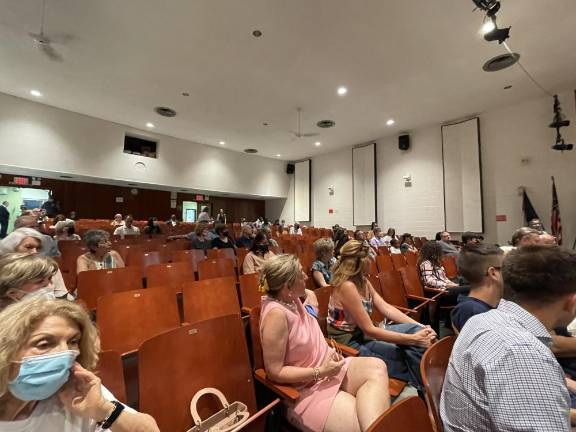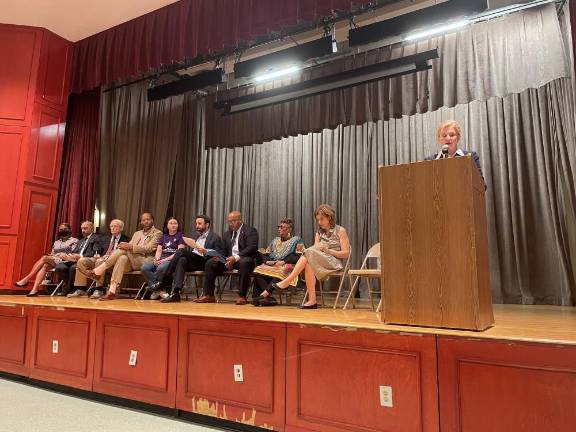What’s Being Done About Guns?
UES town hall, hosted by Rep. Carolyn Maloney, grew rowdy one week after the shooting of Azsia Johnson


An Upper East Side town hall grew rowdy on Wednesday night at P.S. 77 when locals implored a panel of elected officials and police to take tangible steps to quell gun violence in the neighborhood and city, one week after the sidewalk shooting of Azsia Johnson.
“We can talk about what we’re going to do, and make nice speeches, and we can have press events and photo opportunities, and all of those things,” said Liz Fine, an East 95th Street resident. “But what are we going to do? What can we do to help you?”
“I just want change in my neighborhood,” she added.
On the evening of June 29, Johnson, 20, was fatally shot in the head while pushing her three-month-old daughter in a stroller along East 95th Street, between Third and Lexington Avenues outside the local elementary school. Police later arrested Isaac Argro, 22, and charged him with murder and criminal possession of a weapon. Argro, who is reported to have been Johnson’s ex-partner, was said by Johnson’s family to have previously abused and threatened Johnson, and the shooting is being investigated as a case of domestic violence, the New York Times reported.
On the heels of a Supreme Court decision striking down a New York law that strictly limited the ability to carry a gun in public, the Upper East Side tragedy has spurred an intensified look at crime and gun violence. The town hall, hosted by Rep. Carolyn Maloney, was a night “to work for solutions,” the congresswoman said.
“Uniquely An American Phenomenon”
At a federal level, Maloney spoke about steps being taken to lessen the pervasiveness of gun violence by congress, like the passing of the Bipartisan Safer Communities Act, signed into law by President Joe Biden on June 25. The legislation came in the wake of multiple mass shootings, including the killing of 21 at an elementary school in Uvalde, Texas. Since then, the fatal gunning down of seven at a July 4 parade in Highland Park, Illinois has been among the most recent to draw national attention.
“Many of you expressed your concern for safety in our community,” Maloney addressed the crowd in attendance of the town hall, “expressed your concern that a young woman was murdered walking down the street next to a school that serves our children, next to a playground where our children play, near the subway where so many of us travel back and forth to work. And we cannot stand by while our family, friends and neighbors’ lives are cut short by firearm violence.”
Maloney pointed to a connection between gun violence and domestic abuse, saying “guns are the domestic abusers’ weapon of choice,” and spoke about a need for more accessible mental health care. She also commented that “it is clear that the gun violence epidemic is uniquely an American phenomenon” — and called for a total ban on assault weapons. In New York State, a new law prohibits guns in a wide range of “sensitive places,” including subways, bars and schools, after the recent Supreme Court ruling overturned prior legislation.
On the Upper East Side, Council Members Keith Powers and Julie Menin are advocating for measures like increasing the number of neighborhood security cameras and street lights. Menin also noted that the City Council allocated $11.5 million to the DoVE initiative, a Safe Horizon program that provides services to victims of domestic violence.
A Tragedy And A Trend
The night after Johnson was killed, Menin organized a community vigil attended by Johnson’s mother, Manhattan Borough President Mark Levine and Mayor Eric Adams, among others. “It is unfathomable that such a senseless act of violence could happen with a mother pushing her baby in a stroller in front of a school and park,” Menin wrote in an email to the community.
On Wednesday, Adams’ Chief of Staff, Frank Carone, said shootings dropped 30 percent in April and May and that the Mayor was taking steps like suing sellers of “ghost gun” components, which are illegal and untraceable. But 19th Precinct Executive Officer Captain Michael Butler acknowledged a troubling general trend in the neighborhood. “Crime is up, that is a fact,” he said.
Gun violence in particular takes a significant toll on the entire community, many speakers suggested. “Are you sick and tired of being sick and tired?” asked Jackie Rowe-Adams, founder of Harlem Mothers S.A.V.E, a nonprofit anti-gun violence organization.
What If Policing Isn’t The Solution?
Butler said the 19th Precinct’s public safety officers are “working later hours” and guaranteed that domestic violence officers work “tirelessly, each day.” Maloney expressed support for “community policing” programs, which would allow residents to play a more active role in addressing crime by joining officers on their rounds. And one attendee asked about the availability of police to be present outside schools during dismissal. “We feel like our kids are sitting ducks,” she said.
Those expressing dissatisfaction with policing as a sole solution to violent crime dominated as the town hall came to a close. Jay Walker, from the local activist group Gays Against Guns, pointed to recent and severe budget cuts to city schools as a grave mistake.
“You’re talking about funding the end point, the violent endpoint, the carceral endpoint of this cycle,” he said of money funneled toward policing, “while you’re slashing the money away at the place where it begins — because crime begins from need and want.”
“We cannot stand by while our family, friends and neighbors’ lives are cut short by firearm violence.” Rep. Carolyn Maloney